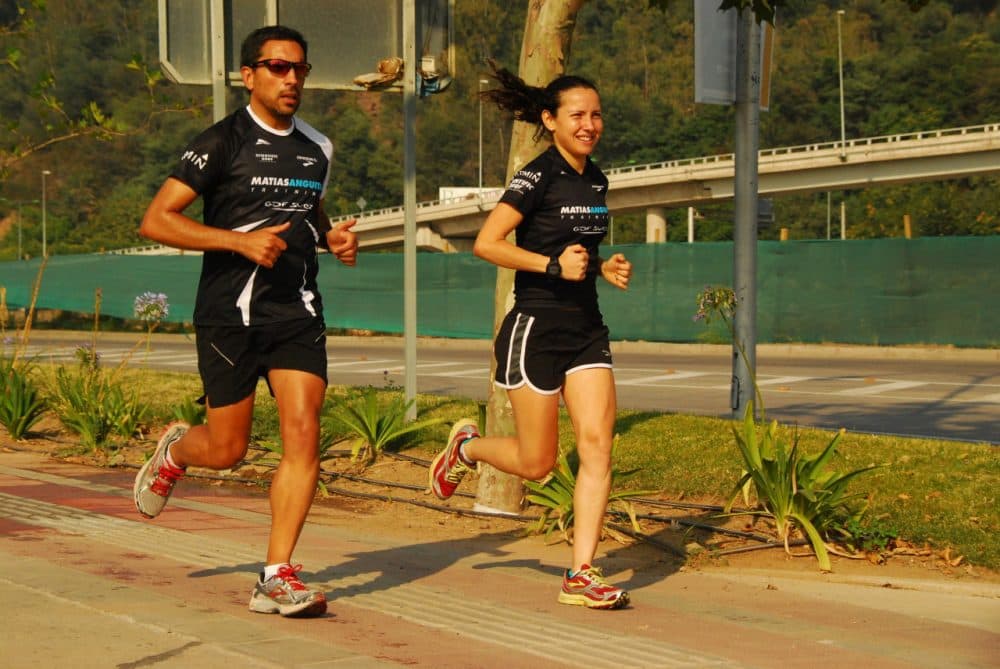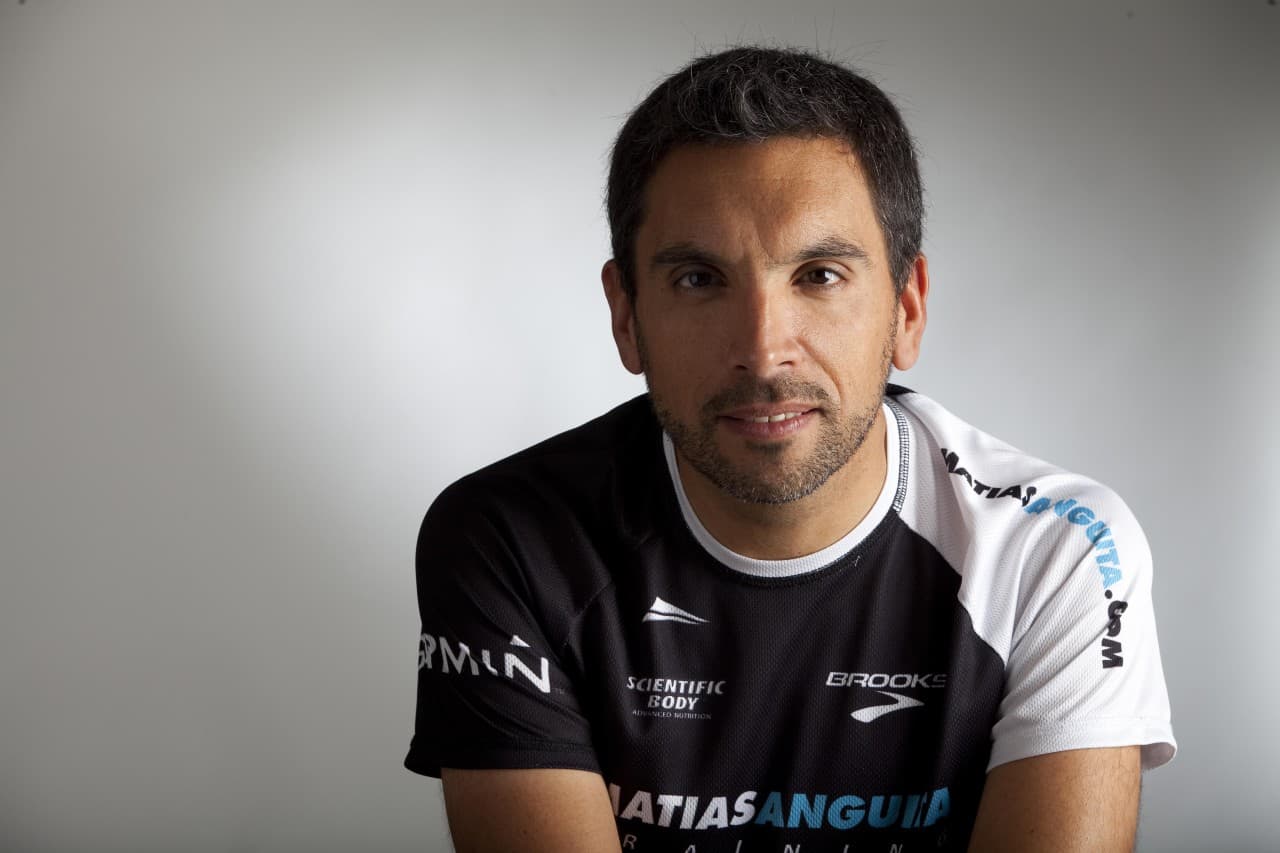Advertisement
Running With Purpose: 63 Days To Combat Smoking In Chile
Resume
Matías Anguita went on his first run when he was 25-years-old. Now, 17 years later, he’s Chile’s most famous ultramarathoner. And, this year, he set a new world record by running the length of Chile — from its northernmost deserts to its southern, nearly-Antarctic tip — in only 63 days.
The Journey
From New Year’s Day until early March in 2014, Anguita ran two marathons every single day — one at 6 a.m. and, after lunch and a nap, a second at 5 p.m. He lived in an RV with a physical therapist, a driver and an administrative assistant. And a police escort accompanied him as he ran along Highway 5, the freeway that snakes 2,500 miles down Chile’s entire length.
Early in his journey, he came upon a father and a son while running in Chile’s northern deserts.
It’s very monotonous because, where the freeway goes, everything looks exactly the same on both sides. It’s flat. It’s just sand, and the cities are really far apart from each other.
Matías Anguita
"He was with his kid getting water from an underground spring of mineral water," Anguita recalled. "And I tried the water, and it was like bubbly mineral water, and I thought, 'If I’d gone by in a car, I would never have tried this; I would never have seen this.'”
It wasn’t always easy, of course. The Atacama Desert, in northern Chile, is not only hot — average highs in the summer are in the mid-70s — it’s also one of the driest places in the world. It seemed to stretch on and on, Anguita said.
"It’s very monotonous. It’s very monotonous because, where the freeway goes, everything looks exactly the same on both sides," he explained. "It’s flat. It’s just sand, and the cities are really far apart from each other."
Six weeks into the trip, Anguita nearly gave up. He was on Chiloé, a rainy island in southern Chile.

"I had been tired for a while of moving around so much, of traveling so much, and that morning we had wanted to do our laundry, but we found out that the laundromat wouldn’t open 'till the afternoon, and in the afternoon we weren’t going to be in Chiloé anymore," he said. "And that basically made me have a breakdown. I said, 'How is it that we can’t even do laundry?'"
At that moment, even though it was a weekday and Anguita was far from the nearest city, three people came running up to join him for a few miles.
"And they’d come quite a distance [to run with me]," he recalled. "And so I said, if these people woke up early and came to run with me, then I’m doing something right. So that was what helped me keep going."
In May, Anguita went for a jog on the Cerro San Cristóbal, a spur of the Andes that juts out into Santiago, Chile’s capital city. He took a break amidst the hill’s eucalyptus and Chilean palms to reflect on how his journey had changed him.
"For two months, I was focused on only one thing: running," he said. "That’s when I realized that one gets caught up in things that don’t matter, like having a nicer car, or having a bigger house. And, in the two months during which all I did was run, I realized that I didn’t need anything else."
Running With A Purpose
The 42-year-old Anguita once smoked two or three packs of cigarettes a day — until, 17 years ago, he decided to give up smoking and start running. Since exercise helps him keep away from tobacco, he hopes it can do the same for others.
María Teresa Valenzuela, a public health researcher at the University of Chile, says smoking is a serious problem in Chile.
[sidebar title="Sub-Two-Hour Marathon?" width="630" align="right"] After Kenya’s Dennis Kimetto posted a 2:02:57, some have speculated a two-hour marathon is imminent. Exercise physiologist Ross Tucker says not so fast. [/sidebar]
"About 40 percent of Chileans over 15 years old smoke," she said. "And what worries us the most is that we hold the world record for the most young girls who smoke: about 39 percent of 13- to 15-year-old girls smoke."
By comparison, only 18 percent of people in the U.S. smoke, according to the Centers for Disease Control and Prevention.
Valenzuela said limiting tobacco use in public spaces, outlawing tobacco advertisements on television and taxing cigarettes are important measures in order to reduce tobacco use. She added that positive role models can help change the country’s smoking culture and counter the sway that tobacco company advertisers have over young people.
"Athletes or artists can have an impact on young people, especially on young people who haven’t started to smoke yet," she said. "And, in that way, it seems fundamental to me that we have public figures who say that not smoking is a much better, much more valued behavior than smoking with one’s friends."
Back on the Cerro San Cristóbal, Anguita said he hopes his trip contributed to the fight against tobacco in Chile.
"There was one man who had led the same life as I had: he smoked a lot and was sedentary," Anguita said. "His children gave him a present — a report about me, about how I had smoked a lot and then I had started to run and changed my life around. The next day, he did exactly what I had done: he bought himself some shoes, and he started running. And, when I went by La Serena [a city in northern Chile], he was waiting for me with his son. He told me the story, and he ran 10 km with me."
According to Anguita, his story has a clear moral.
"If I could [change my life], anyone can," he said. "I used to smoke three packs a day, so anyone can [give up smoking]."
For his next challenge, Anguita plans to run from Buenos Aires to Valparaíso, Chile — from the Atlantic, over the Andes, and to the Pacific — in March.
Related:
This segment aired on January 3, 2015.